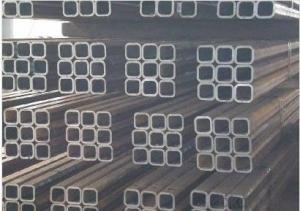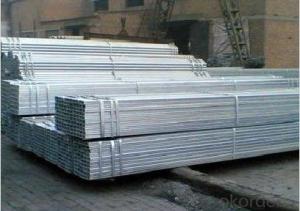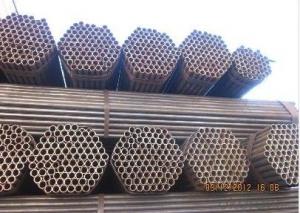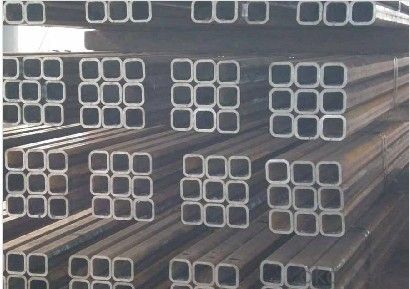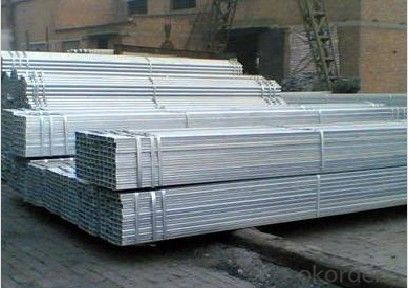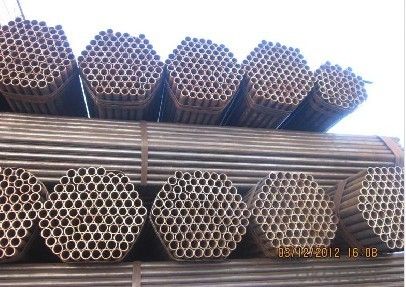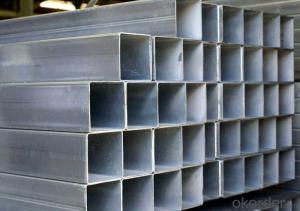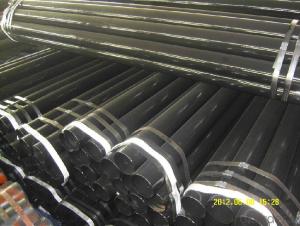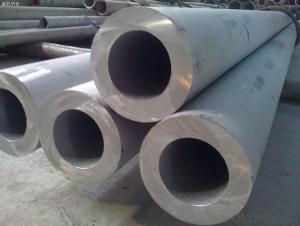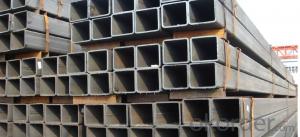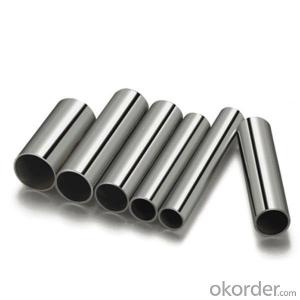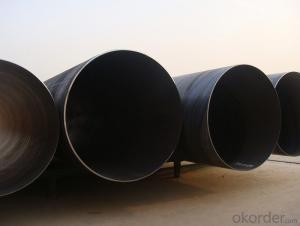Rectangular steel tube from cnbm okorder.com
- Loading Port:
- Tianjin
- Payment Terms:
- TT or LC
- Min Order Qty:
- 50 m.t.
- Supply Capability:
- 20000 m.t./month
OKorder Service Pledge
OKorder Financial Service
You Might Also Like
1、Structure of Cold Finished Welded hollow Sections Grade: S355j2h En 10219size:100 X 100 X 6 M:
Black square&rectangular pipe welded pipe .factory steel ,ISO 9001
2、Main Features of Cold Finished Welded hollow Sections Grade: S355j2h En 10219size:100 X 100 X 6 M:
• High manufacturing accuracy
• High strength
• Small inertia resistance
• Strong heat dissipation ability
• Good visual effect
• Reasonable price
3、Cold Finished Welded hollow Sections Grade: S355j2h En 10219size:100 X 100 X 6 MSpecification:
Standard | GB, DIN, ASTM ASTM A106-2006, ASTM A53-2007 |
Grade | 10#-45#, 16Mn 10#, 20#, 45#, 16Mn |
Thickness | 8 - 33 mm |
Section Shape | Round |
Outer Diameter | 133 - 219 mm |
Place of Origin | Shandong, China (Mainland) |
Secondary Or Not | Non-secondary |
Application | Hydraulic Pipe |
Technique | Cold Drawn |
Certification | API |
Surface Treatment | factory state or painted black |
Special Pipe | API Pipe |
Alloy Or Not | Non-alloy |
Length | 5-12M |
Outer Diameter | 21.3-610mm |
Grade | 20#, 45#, Q345, API J55, API K55, API L80, API N80, API P110, A53B |
Standard | ASME, ASTM |
1) Material:20#(ASTM A 106/A53 GRB.API5LGRB,GB),45#,16Mn,10#.
2) Specification range:OD:21.3-610mm,WT:6-70mm,length:6-12m or according to the requirement of clients.
3) Excutive standards:GB,ASME API5L.ASTM A 106/A53,Despite of the above standards,we can also supply seamless steel pipe with standard of DIN,JIS,and so on,and also develop new products according to the requirements of our clients!
4) Surface:black lacquered,varnish coating or galvanized.
5) Ends:Beveled or square cut,plastic capped,painted.
6) Packing:bundles wrapped with strong steel strip,seaworthy packing.
4、Packaging & Delivery
Packaging Details: | seaworthy package,bundles wrapped with strong steel strip |
Delivery Detail: | 15-30days after received 30%TT |
5、FAQ of Cold Finished Welded hollow Sections Grade: S355j2h En 10219size:100 X 100 X 6 M:
①How is the quality of your products?
Our products are manufactured strictly according to national and internaional standard, and we take a test
on every pipe before delivered out. If you want see our quality certifications and all kinds of testing report, please just ask us for it.
Guaranteed: If products’ quality don’t accord to discription as we give or the promise before you place order, we promise 100% refund.
②How about price?
Yes, we are factory and be able to give you lowest price below market one, and we have a policy that “ for saving time and absolutely honest business attitude, we quote as lowest as possible for any customer, and discount can be given according to quantity”,if you like bargain and factory price is not low enough as you think, just don’t waste your time.Please trust the quotation we would give you, it is professional one.
③Why should you chose us?
Chose happens because of quality, then price, We can give you both.Additionally, we can also offer professional products inquiry, products knowledge train(for agents), smooth goods delivery, exellent customer solution proposals.Our service formula: good quality+good price+good service=customer’s trust
SGS test is available, customer inspection before shipping is welcome, third party inspection is no problem.
6、Cold Finished Welded hollow Sections Grade: S355j2h En 10219size:100 X 100 X 6 M Images:
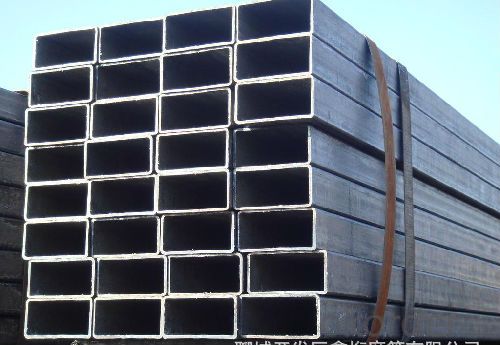
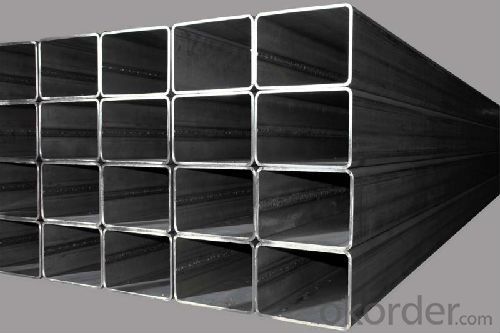
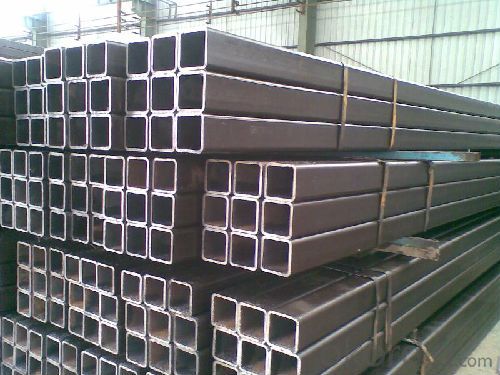
- Q: What are the different types of steel pipe coatings for nuclear power plants?
- There are several types of steel pipe coatings used in nuclear power plants, including epoxy coatings, polyethylene coatings, fusion bonded epoxy coatings, and coal tar enamel coatings. These coatings are applied to steel pipes to provide protection against corrosion, enhance durability, and maintain the integrity of the pipes in the demanding environment of nuclear power plants.
- Q: What are the different methods of coating steel pipes for insulation?
- Insulating steel pipes can be achieved through various methods, each with its own pros and cons. 1. One method involves applying a layer of thermal insulation material, like mineral wool or foam, onto the steel pipes. This helps minimize heat transfer and energy loss. While these coatings are easy to apply and offer excellent insulation properties, they are prone to degradation over time and require regular maintenance and replacement. 2. Another approach is to coat the steel pipes with materials that protect against corrosion, such as epoxy or polyethylene. These coatings act as a barrier, shielding the pipes from moisture, chemicals, and other corrosive elements. They are durable and long-lasting, providing effective protection. However, they may not offer significant thermal insulation. 3. Fusion-bonded epoxy (FBE) coating is a popular method that combines both insulation and corrosion protection. It involves applying a layer of epoxy powder to the pipes and heating it to create a strong bond. FBE coatings offer excellent adhesion, corrosion resistance, and some thermal insulation properties. They are commonly used in oil and gas pipelines, enduring harsh environments and high temperatures. 4. Polyurethane foam is often used as an insulation coating for steel pipes. It is applied by spraying or injecting the foam onto the pipe surface, where it expands and hardens, forming a protective layer. Polyurethane foam coatings provide exceptional thermal insulation and can be applied to pipes of different shapes and sizes. However, they require specialized equipment and expertise and may be susceptible to physical damage or moisture absorption if not properly sealed. 5. Ceramic coatings offer yet another option for insulating steel pipes. These coatings are typically applied through a thermal spray process, creating a layer of ceramic material on the pipe surface. Ceramic coatings provide insulation against high temperatures, corrosion resistance, and thermal shock protection. They are commonly used in industries like power generation and aerospace, where extreme temperature conditions are present. However, ceramic coatings can be costly and require specialized equipment and expertise for application.
- Q: Can steel pipes be coated for additional protection?
- Yes, steel pipes can be coated for additional protection. Coating the pipes helps to prevent corrosion, enhance durability, and improve resistance to various environmental factors.
- Q: How are steel pipes affected by international trade policies?
- Steel pipes can be significantly affected by international trade policies. For instance, trade barriers such as tariffs or quotas can increase the cost of importing steel pipes, making them less competitive compared to domestically produced pipes. Conversely, liberalized trade policies can enhance market access for steel pipe exporters, allowing them to expand their market share globally. Overall, the impact of international trade policies on steel pipes depends on the specific policies implemented and their effect on the cost, availability, and competitiveness of these products in the international market.
- Q: What are the different types of steel pipe reducers?
- There are several types of steel pipe reducers, including concentric reducers, eccentric reducers, and reducing tees.
- Q: Can steel pipes be used for conveying potable water?
- Yes, steel pipes can be used for conveying potable water. However, there are some considerations and precautions that need to be taken into account. Steel pipes are strong and durable, making them suitable for transporting water over long distances. They are also resistant to corrosion and can withstand high pressure. To ensure the safety and quality of the water being transported, it is important to use pipes that are specifically designed and manufactured for potable water applications. These pipes are often coated or lined with materials that prevent the leaching of contaminants into the water, such as epoxy or cement mortar lining. Additionally, regular maintenance and inspections should be conducted to prevent the buildup of sediments or rust that could affect the water quality. It is worth noting that steel pipes can be more expensive compared to other materials like plastic or copper. However, their longevity and reliability make them a cost-effective choice in the long run. It is also important to comply with local regulations and standards regarding the use of steel pipes for conveying potable water to ensure the health and safety of consumers.
- Q: Can steel pipes be used for conveying oil?
- Yes, steel pipes can be used for conveying oil. Steel pipes are commonly used in the oil and gas industry for transporting oil due to their strength, durability, and resistance to corrosion. The high strength of steel pipes allows them to withstand the high pressure and temperature conditions that are often associated with oil transportation. Additionally, steel pipes are less prone to leakage and damage compared to other materials, making them a reliable choice for conveying oil over long distances. Moreover, the smooth interior surface of steel pipes helps to minimize friction and enhance the flow of oil. Overall, steel pipes are a preferred option for oil transportation due to their superior mechanical properties and long-term performance.
- Q: What are the factors affecting the durability of steel pipes?
- There are several factors that can affect the durability of steel pipes, including the quality of the steel used, the manufacturing process, the environment in which the pipes are installed, and the maintenance and care given to the pipes.
- Q: Can steel pipes be used for chimney flues?
- Yes, steel pipes can be used for chimney flues. Steel pipes are commonly used for chimney flues due to their durability, heat resistance, and ability to withstand high temperatures. They provide a reliable and efficient solution for venting smoke and gases from a fireplace or stove.
- Q: What are the applications of steel pipes?
- Steel pipes have a wide range of applications in various industries due to their durability, strength, and versatility. Some of the common applications of steel pipes include: 1. Plumbing and water distribution: Steel pipes are commonly used in plumbing systems to transport water and other fluids. They are resistant to corrosion and can withstand high pressure, making them ideal for water distribution networks in residential, commercial, and industrial buildings. 2. Oil and gas industry: Steel pipes are extensively used in the oil and gas industry for the transportation of oil, natural gas, and other petroleum products. They are able to handle high-pressure and high-temperature environments, making them crucial in drilling, production, and refining processes. 3. Construction and infrastructure: Steel pipes are widely employed in construction projects for various purposes such as structural support, foundations, scaffolding, and underground piping systems. They provide a strong and reliable framework for buildings, bridges, tunnels, and highways. 4. Industrial applications: Steel pipes are used in various industrial applications such as manufacturing, power plants, chemical processing, and food processing. They are often used to transport liquids, gases, or slurries within the production processes or to transfer heat in heat exchangers and condensers. 5. Agricultural sector: Steel pipes are commonly used in the agricultural sector for irrigation systems, particularly in large-scale farming. They are used to transport water from a water source to the fields, ensuring efficient and controlled water distribution. 6. Mining industry: Steel pipes are utilized in the mining industry for the extraction and transportation of minerals, ores, and other mining materials. They are resistant to abrasion and corrosion, making them suitable for the harsh and demanding conditions of mining operations. 7. Mechanical and automotive applications: Steel pipes find application in the manufacturing of various mechanical components, such as automotive exhaust systems, hydraulic cylinders, and precision tubing. They offer high strength, dimensional stability, and resistance to impact and vibration. 8. Infrastructure and utilities: Steel pipes are commonly used in infrastructure projects for the transportation of sewage, stormwater, and wastewater. They are durable, resistant to chemical corrosion, and can withstand underground conditions, making them suitable for sewer and drainage systems. In summary, the applications of steel pipes are vast and diverse, ranging from plumbing and water distribution to oil and gas industry, construction, agriculture, mining, mechanical and automotive sectors, and infrastructure projects. Their robustness, versatility, and ability to withstand extreme conditions make them a fundamental component in numerous industries.
Send your message to us
Rectangular steel tube from cnbm okorder.com
- Loading Port:
- Tianjin
- Payment Terms:
- TT or LC
- Min Order Qty:
- 50 m.t.
- Supply Capability:
- 20000 m.t./month
OKorder Service Pledge
OKorder Financial Service
Similar products
Hot products
Hot Searches
Related keywords
